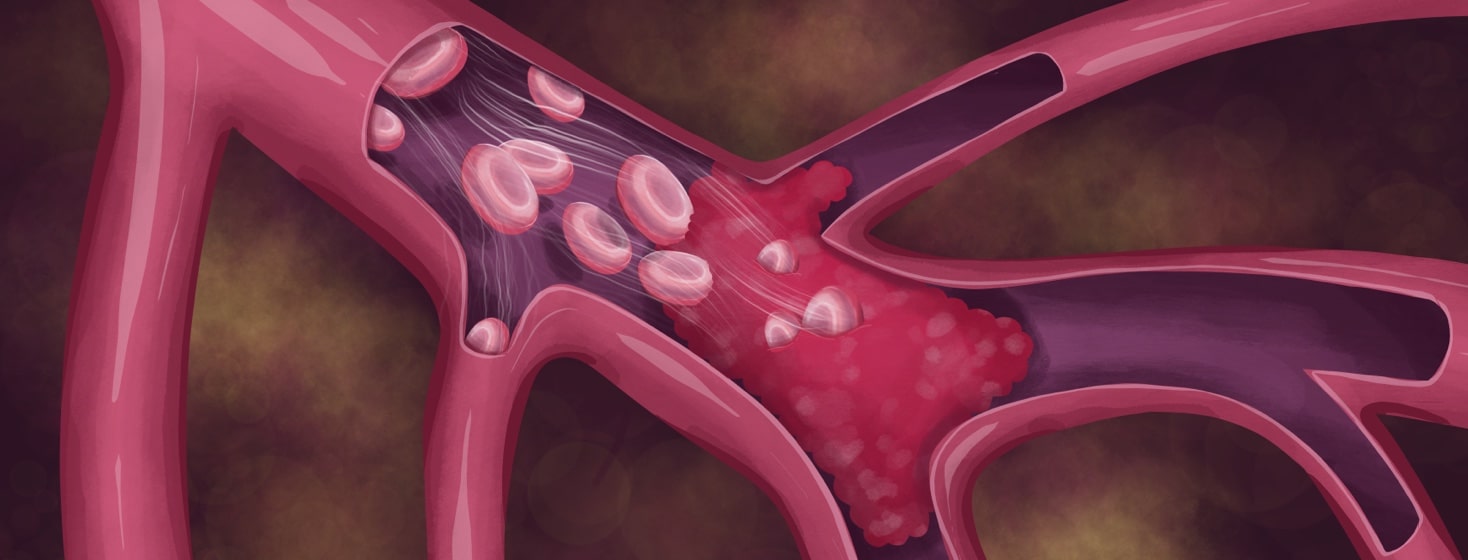Blood Clots, Pulmonary Embolisms, and Ovarian Cancer
Cancer and its treatments can put you at risk for many other health issues. Blood clots are one such risk. One out of every 5 blood clots diagnosed is caused by cancer or treatment. Plus, those with cancer who also have blood clots have lower survival rates.1
A 2017 study showed those undergoing treatment for ovarian cancer have a high risk of blood clots. Understanding the link between blood clots and cancer might help change treatment protocol and lessen the chance of having a blood clot.2,3
What are blood clots?
A blood clot is a clump of blood that sticks together. A clot can stay in 1 spot and block the flow of blood. It can also break away and travel through the blood. The types of blood clots include:4
- Thrombus – Forms in a vein and stays in the vein.
- Thromboembolism – A thrombus that breaks loose and moves to another blood vessel.
- Deep vein thrombosis (DVT) – A thrombus that forms in the deep veins in the leg.
- Pulmonary embolism (PE) – A blood clot that forms in 1 area, like the leg, and moves into the lung.
- Venous thromboembolism (VTE) – Blood clots in the veins. This term describes DVTs and PEs.
- Disseminated intravascular coagulation (DIC) – A condition where many small blood clots form. Clotting proteins are too active.
Blood clots, especially VTEs, can be fatal. Immediate medical care is needed to break up a blood clot.4
What are the risk factors for blood clots?
Many things can raise the risk for blood clots, such as:1,4,5
- Certain cancers, including ovarian, kidney, lung, and blood cancers
- Later-stage cancer
- Cancer treatment
- Medical history, including prior major surgeries, bad muscle injuries, or trauma
- Heart or lung disease, diabetes
- Being overweight, obese, or immobile
- Smoking
- Some cancer drugs, including tamoxifen, lenalidomide, and thalidomide
Some supplements, vitamins, and minerals can also contribute to blood clots. Talk to your doctor if you are taking any drug, even if it is over-the-counter.4
Why is cancer linked to blood clots?
Doctors think the cancerous tumors could be to blame. Tumors emit chemicals in the body. This can affect the ability of blood to clot. Also, sitting and immobility are linked to blood clots. Cancer and its treatments often cause a less mobile lifestyle, which can cause blood clots.2,3
Blood clots make it hard for doctors to treat cancer. VTEs make you more likely to be admitted to the hospital and lower your chances of survival. Plus, having 1 blood clot makes you more likely to have another. Understanding exactly how ovarian cancer and blood clots are linked will help guide better treatment strategies.5
The link between ovarian cancer and blood clots
A 2017 study looked at the link between ovarian cancer and blood clots. Doctors wanted to know if those with ovarian cancer have a higher risk of blood clots and when these blood clots formed during treatment.2,3
Surgery is the preferred first treatment for ovarian cancer followed by chemotherapy (adjuvant chemotherapy). Those who cannot immediately have surgery have chemotherapy first (neoadjuvant chemotherapy). Of 112 people with advanced ovarian cancer, 30 (26.8 percent) had pulmonary embolism or deep vein thrombosis. Of those:2,3
- 13 (11.6 percent) had a PE or DVT during neoadjuvant chemo
- 6 (5.4 percent) had a PE or DVT after surgery
- 11 (9.9 percent) had a PE or DVT during adjuvant chemotherapy
This means that more than 1 in every 4 people undergoing treatment for ovarian cancer experience a PE or DVT.2,3
How might these results affect ovarian cancer treatment?
Much of the emphasis on preventing blood clots has been for those on adjuvant chemotherapy. Blood thinners, which lower the risk of clots, are commonly used after surgery.2,3,6
At the time of the study, doctors were not regularly starting blood thinners in those treated with neoadjuvant chemotherapy. However, these results suggest using blood thinners before surgery may lower the risk of clots.2,3,6
While these results are promising for people with ovarian cancer, the study has limitations. It is small. The study looked only at those with advanced ovarian cancer. It is possible that the rates of blood clots are actually lower than what is reported.2,3,6
If you are undergoing treatment for ovarian cancer, talk to your doctor about your risk of blood clots and prevention. Your doctor can help you take steps to reduce your risk of VTEs.

Join the conversation